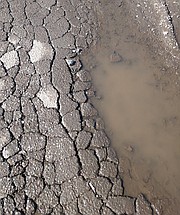Plains street conditions boil down to drainage issues
The streets of Plains are falling apart; there’s just no denying it. And, as with anything this big, the solutions are complicated and affect people’s lives.
But we all need streets, so it might take some changes to keep them.
Plains Mayor Dan Rowan explains that the problem is water. Without ditches and other drainage, water collects and soaks into and softens the roadbeds, causing them to crumble with every vehicle that rolls over them. Most of the streets were not built with rock foundations in the first place, so they are especially vulnerable to turning into muck when they are saturated.
Over time, city property beside the road has been used for parking, and private lot owners have added fill or lawn up to the road edges, often without ever even knowing it was city property that was needed for road drainage and utility easements. After years of discussion and planning, with input from locally experienced road builders, it is clear that proper drainage must be built along the street sides, and that means private uses of the city’s property will be affected.
2019 will be the second year of a five-year street improvement project that Plains residents gave the go-ahead by voting in a temporary property tax levy. The first high-priority sites were done in 2018: First Street received desperately needed drainage and repaving, and chip seal was placed on Central Avenue, and Ryan and Boyer Streets. This year, Willis Street is on deck for ditching and pavement, just east of City Hall.
Rowan wants to ensure that people’s access needs are met as the ditching work proceeds along the sides of the streets.
“If the new ditch cuts through someone’s driveway, the city will provide a pipe and make sure they have a driveway,” says Rowan. If there is need for another access point, residents can purchase their own culvert and the city will still install it while their equipment is in the area. But traditional street-side parking areas may be gone once the ditches get built.
“The community recognized the need and gave us a chance to start working on this problem,” says Rowan. “Folks will be able to judge whether we have spent the revenue effectively. If they don’t think it’s been used wisely, they don’t have to support it in the future. But we will be asking for it again once these first projects are done, because we need it.”
Except for this and last year on the special levy, there has historically been significantly less money available in the budget for street improvements and maintenance than the $40,000 the pool requires every year.
“We will do our best to use the levy revenue efficiently, to do the most we can and meet the needs of residents,” Rowan says.





